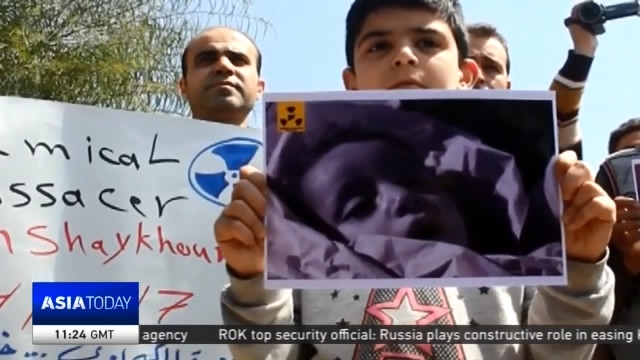
20:05, 15-Mar-2018
Syria Conflict: One of century's deadliest wars enters eighth year

A conflict that began as a peaceful uprising against President Bashar Assad in early 2011, has turned into one of the deadliest wars of the century, and despite much international effort, there doesn't seem to be any end in sight. Rory Coen looks back at the key events of the past year.
On 4th April, 2017, the town of Khan Sheikhoun was subjected to a chemical attack, in which 74 people lost their lives, many of them children.
There were deadlier episodes in the war, but a chemical attack is seen, by any standards, as crossing a so-called "red line".
Syrian President Bashar Al-Assad denied any involvement, but his words weren't enough to convince his American counterpart, Donald Trump, who directed the launch of 59 Tomahawk cruise missiles at a Syrian airbase --- the first direct military action against Assad by the US.
DONALD TRUMP US PRESIDENT "Tonight I ordered a targeted military strike on the airfield in Syria from where the chemical attack was launched. It is in this vital national security interest of the United States to prevent and deter the spread and use of deadly chemical weapons."
Besides the US, the involvement of other regional and global powers have complicated the situation further.
Turkey has long supported the rebels, but Iran is believed to have deployed hundreds of troops and spent billions of dollars helping Assad.
Russia got involved in the conflict in 2015 and is now Assad's most important ally.
With Moscow's help, Syrian government forces took full control of Deir al-Zour from Islamic State last November, leaving the militant group with only a sparse presence in the country.
And in a surprise visit to Syria, Russian President Putin declared "mission accomplished" in the battle against ISIL, and ordered the beginning of a troop withdrawal from Syria.
VLADMIR PUTIN RUSSIAN PRESIDENT "I have taken a decision: a significant part of the Russian troop contingent located in Syria is returning home to Russia."
Peace negotiations have been ongoing between the Syrian government and the opposition for the past few years, but there have been no significant breakthroughs.
UN-sponsored talks in Geneva and Russian-brokered negotiations in Sochi have failed to raise any credible prospect of a political solution.
Russian, Iran and Turkey did agree to establish four de-escalation zones in Astana last May, which did bring relative peace to these areas. Tomorrow, the three parties will meet once again, as they look to make further progress.

SITEMAP
Copyright © 2018 CGTN. Beijing ICP prepared NO.16065310-3
Copyright © 2018 CGTN. Beijing ICP prepared NO.16065310-3